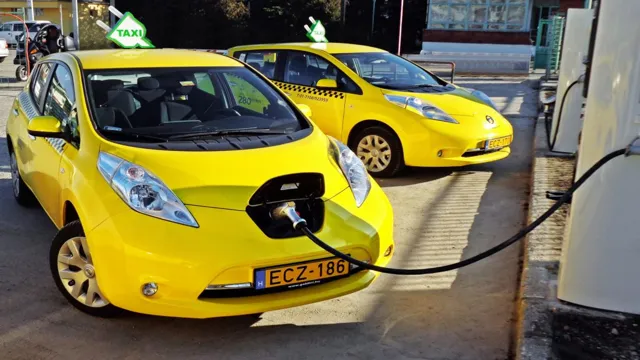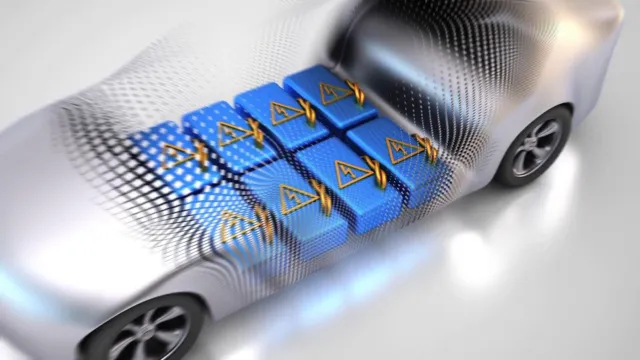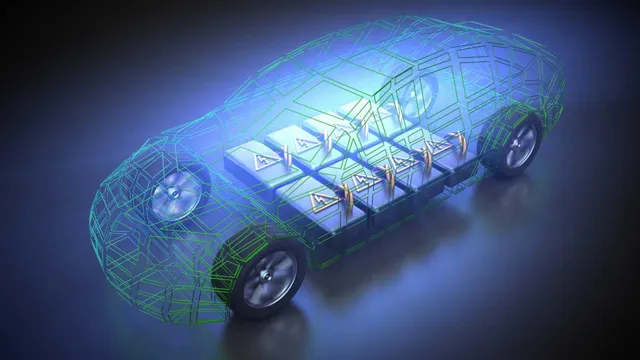Powering the Future: Top Battery Companies Leading the Charge in Electric Cars
Electric cars have come a long way in recent years, and one of the most important aspects of these vehicles is their range. As a result, battery technology has become a major focus for the top companies in the electric car industry. Maximizing range is crucial for drivers, as it determines how far they can go on a single charge.
Thus, it’s no surprise that companies are putting a lot of effort into developing the best batteries possible. By using the latest advancements in technology and collaborating with leading research institutions, these companies are striving to create batteries that offer longer ranges and faster charging times. So, which companies currently rank at the top when it comes to electric car batteries? And how are they able to maximize range while still producing quality batteries? Let’s take a closer look at some of the top companies in the industry and their latest advancements in battery technology.
Introduction: The Importance of Battery Technology in Electric Cars
When it comes to electric cars, battery technology is one of the most important factors that determine their performance and usability. The batteries used in electric cars play a vital role in how far the car can travel on a single charge, how quickly it can be charged, and how long the battery can last. As a result, battery companies are playing a crucial role in shaping the future of electric cars.
While electric cars are becoming more popular, the technology behind their batteries is also rapidly improving. Companies such as Tesla, LG Chem, and Panasonic are investing heavily in developing batteries that are more efficient, longer-lasting, and faster-charging. These advancements in battery technology are not only making electric cars more practical for everyday use, but they are also helping to reduce our reliance on fossil fuels and transition to a more sustainable future.
So, the role of battery companies in the success of electric cars cannot be overstated.
Brief History of Battery Technology in Electric Cars
Battery technology is one of the most important aspects of electric cars. It is the beating heart that powers the vehicle and allows it to move. Although the concept of electric vehicles has been around since the 19th century, battery technology was not advanced enough to make it commercially viable.
However, with the advent of new technologies, lithium-ion batteries have become the go-to power source for electric cars, and they have come a long way in a relatively short time. With the increasing popularity of electric cars, battery technology is advancing at a breakneck pace, and the future looks bright. So, whether you’re a seasoned EV driver or just starting out, understanding the history and current state of battery technology is essential to appreciate what these vehicles have to offer and what the future holds.
Overview of Top Battery Companies for Electric Cars
Battery Technology in Electric Cars Electric vehicles have become increasingly popular over the years, and battery technology plays a vital role in their success. The battery is the most crucial component of an electric car, providing the power needed to run the engine. Modern electric cars boast different types of batteries, with lithium-ion variants being the most popular due to their high energy density.
But it’s not just about the type of battery; the capacity, efficiency, and safety features are all important factors to consider. Top companies such as Tesla, Panasonic, LG Chem, and CATL are leading the way in battery technology, with their focus on improving performance while reducing the cost of production. As electric cars continue to gain momentum and popularity, advancements in battery technology will likely determine which companies dominate the market.
Comparing Top Battery Companies for Electric Cars
When it comes to electric cars, having a reliable and efficient battery is essential. There are several top battery companies that are producing batteries for electric cars. One of the top battery companies is Tesla, which produces their own batteries for use in their electric cars.
Another popular battery company is LG Chem, which provides batteries for a variety of electric car manufacturers including Audi and Chevrolet. Panasonic is also a major player in the industry, supplying batteries for the Tesla Model S and Model X. Overall, it’s important to consider factors such as price, performance, and reliability when choosing a battery for your electric car.
It’s no surprise that the battery is one of the most important components of an electric car, and choosing the right one can make all the difference in driving experience and long-term maintenance costs.
Battery Capacity and Energy Density Comparison
When comparing top battery companies for electric cars, it’s essential to consider battery capacity and energy density. Tesla leads the pack with their 2170 cells, which boast an energy density of 265 Wh/kg and a capacity of 8 Ah.
However, other companies like LG Chem and Panasonic are not far behind, offering energy densities of 260 Wh/kg and 240 Wh/kg, respectively. Additionally, CATL, BYD, and Samsung SDI are quickly gaining ground, with their latest battery offerings featuring high energy densities of up to 300 Wh/kg. Energy density is crucial because it directly impacts the range of an electric car, and a higher density means that a smaller and lighter battery can provide longer driving distances.
Battery capacity is also vital as it determines the amount of charge the battery can store and, therefore, how far a car can go between charges. Ultimately, the company that can provide the highest energy density and capacity while maintaining affordability will likely win the race in the electric car market.
Charging Time and Lifespan Comparison
When it comes to electric cars, one of the main concerns for drivers is charging time and battery lifespan. Different battery companies have different charging capabilities and lifespans. Let’s take a look at some of the top battery companies for electric cars and compare their charging time and lifespan.
Tesla’s Supercharger can charge up to 80% in just 30 minutes, which is considered to be one of the fastest charging times in the industry. The company claims that their batteries can last up to 300,000 to 500,000 miles, which is a significant advantage for those who plan to drive their electric vehicles for a long time. Another major player in the industry is LG Chem, which boasts a charging time of 30 minutes to 80% and a lifespan of around 10-15 years.
On the other hand, Nissan’s Leaf offers a slower charging time of 45 minutes to 80% but has a longer lifespan of 10-12 years. It’s important to note that other factors such as temperature and usage will also impact the battery lifespan. Ultimately, choosing the right battery company depends on your driving needs and preferences.
By comparing these top battery companies, you can make an informed decision and find the best battery for your electric car.
Cost and Availability Comparison
When it comes to electric cars, one of the biggest concerns is the cost and availability of batteries. There are several top battery companies that are making a name for themselves in the electric car industry. Tesla is one of the most prominent battery companies, with their Model S leading the way in luxury electric cars.
However, Tesla batteries are not the cheapest and may not be the most readily available. Other top battery companies include LG Chem, Panasonic, and Samsung SDI. Each of these companies offers its own advantages, such as LG Chem’s affordability, Panasonic’s reputation for reliability, and Samsung SDI’s experience in producing batteries for mobile devices.
Ultimately, the choice of battery will depend on the specific needs of the electric car owner, as well as the availability and cost of batteries from each of these companies. Regardless of which company is chosen, it’s clear that the electric car industry is rapidly growing, and battery technology is improving to keep pace with this growth.
Benefits of Owning an Electric Car with Top Battery Companies
When it comes to owning an electric car, the benefits are endless. Not only are they eco-friendly and energy-efficient, but they also save you money on fuel costs in the long run. The key to a successful electric car is the battery, and choosing the right battery company is crucial.
Top battery companies like Tesla, LG Chem, and Panasonic offer high-performance batteries that can power your car for longer periods of time with faster charging speeds. These batteries are also incredibly durable, with some companies offering warranties up to 10 years. With an electric car powered by a top battery company, you can enjoy a quieter and smoother ride while reducing your carbon footprint and saving money on gas.
So, if you’re considering making the switch to an electric car, be sure to choose a trusted battery company like Tesla, LG Chem, or Panasonic for the best results.
Maximizing Range and Efficiency
If you’re looking to maximize range and efficiency in your electric car, you can’t go wrong with a top battery company. These companies are at the forefront of technology, producing batteries that can take you further on a single charge and provide better performance overall. Plus, by choosing a reputable battery company, you’ll have peace of mind knowing that your car’s battery is reliable and safe.
Some of the benefits of owning an electric car with a top battery company include longer battery life, faster charging times, and improved overall efficiency. So if you want to get the most out of your electric car, it’s worth considering a battery from one of these top companies.
Reduced Maintenance Costs and Environmental Impact
If you’re considering purchasing a new car, going electric could save you money in the long run. Many top battery companies now offer electric cars that come with a reduced maintenance cost and environmental impact. The lack of an internal combustion engine means that electric cars generally require much less maintenance than traditional vehicles as there is no need for oil changes or tune-ups.
This translates into fewer visits to the mechanic and lower overall maintenance costs. Moreover, electric cars help reduce greenhouse gas emissions and air pollution, which could positively impact the environment. By choosing to own an electric car from one of the top battery companies such as Tesla or Nissan, you can embrace a more sustainable lifestyle while also enjoying the benefits of owning a car that’s cost-effective and easy to maintain.
Conclusion: Choosing the Right Battery Company for Your Electric Car
In conclusion, battery companies are the driving force behind the electric car revolution. Without battery technology advancements, the dream of a zero-emissions future is just that – a dream. As the demand for electric vehicles continues to grow, battery companies must keep up with the pace of innovation in order to power the electric cars of tomorrow.
So the next time you see an electric vehicle on the road, remember that behind the wheel is not only a responsible driver but also a battery company that is helping to shape the future of transportation. After all, a car is only as good as the battery that powers it.”
FAQs
What are some of the leading battery companies for electric cars?
Some of the leading companies for electric car batteries include Tesla, LG Chem, Panasonic, and Samsung SDI.
Are there any advancements in battery technology for electric cars?
Yes, advancements include developments in solid-state batteries, which have the potential to increase range and improve safety in electric cars.
Can electric cars be charged on a regular power outlet?
Yes, electric cars can be charged using a regular power outlet, but it may take longer to fully charge the vehicle compared to using a dedicated charging station.
How long do electric car batteries typically last?
Electric car batteries can last anywhere from 8 to 15 years, depending on the usage and maintenance of the battery. However, battery degradation over time will result in reduced range and performance.





